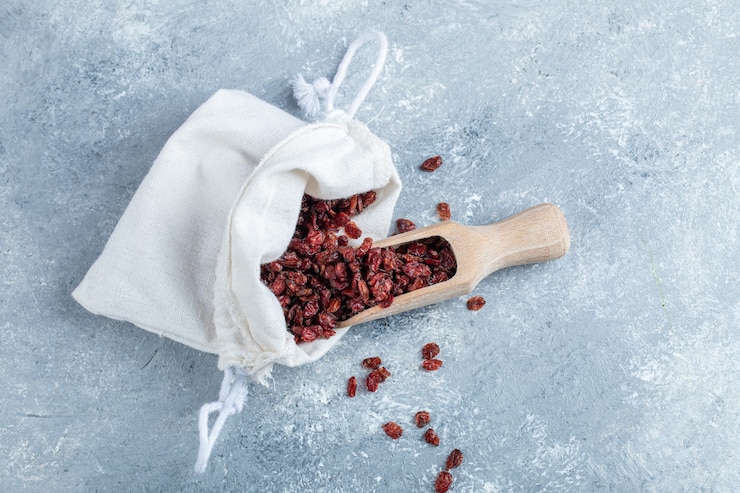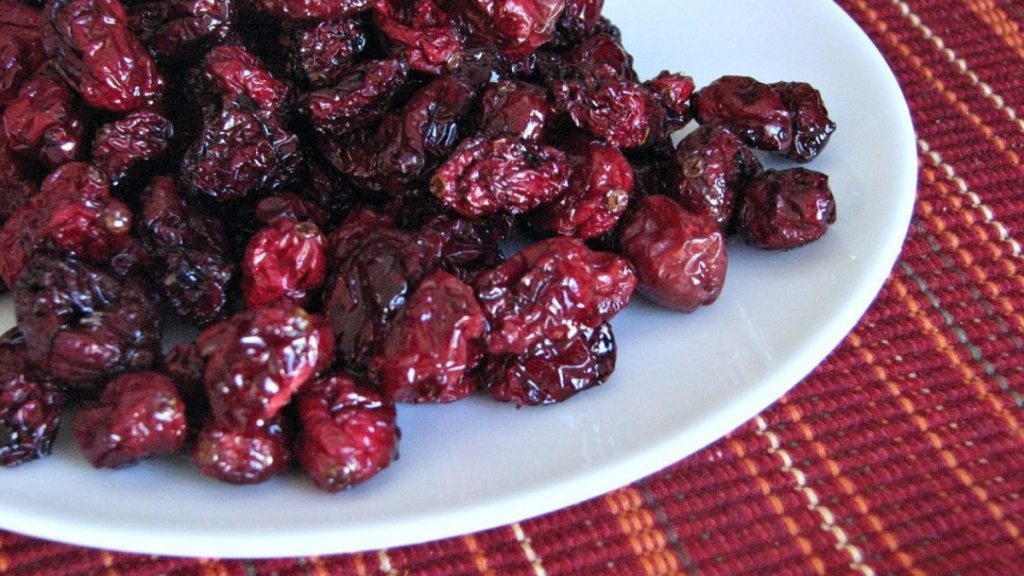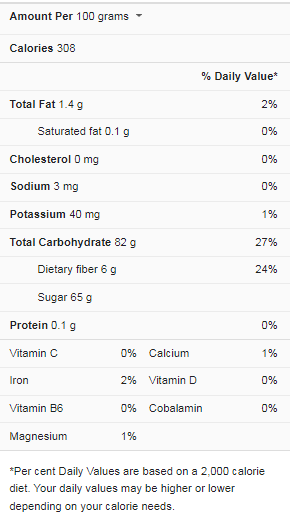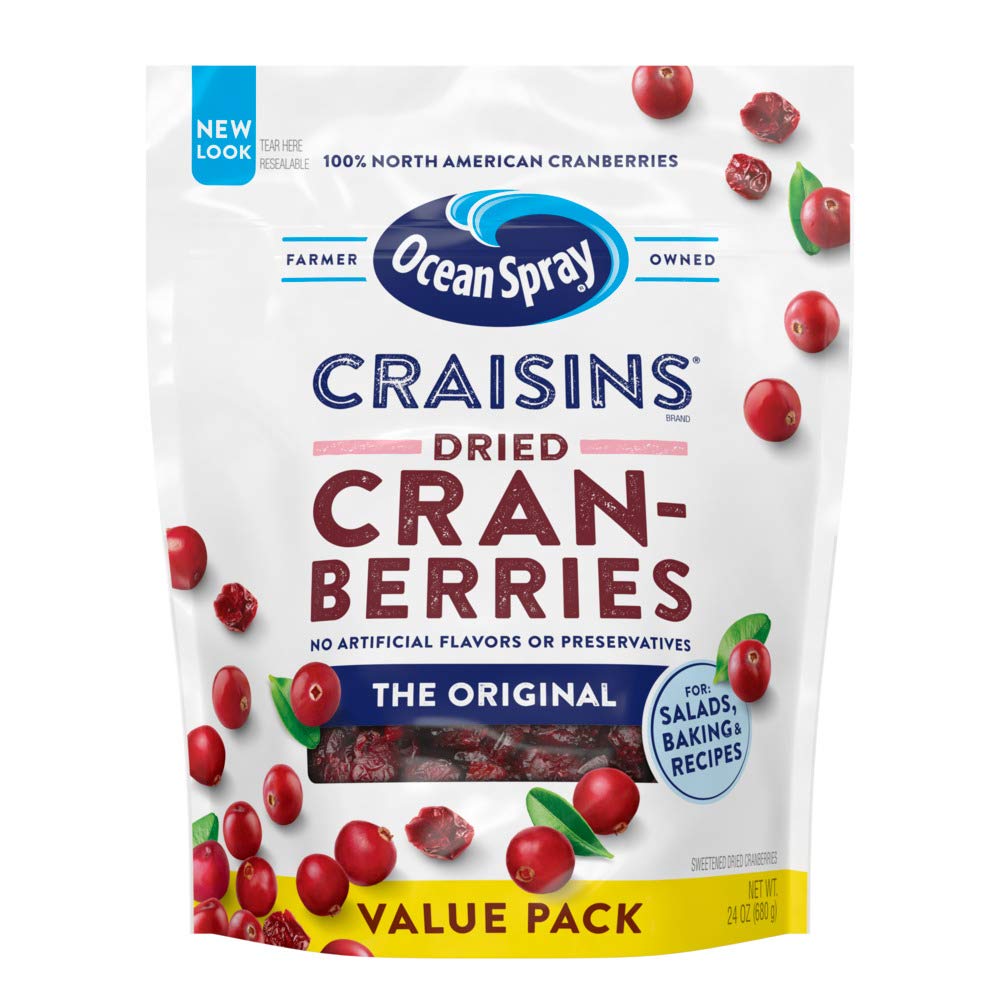Cranberries have significant nutritional content and beneficial medical properties, making them a year-round fruit. Dried cranberries are popular with people of all ages, including teenagers, adults, and even small children. The fruit is a popular choice for skin remedies and is a natural answer to many health concerns. Dried cranberries should be a part of your diet if you want to maintain your skin radiant and healthy Cranberries, whether dried or fresh, have been shown to prevent breast cancer in women.
Acne, dandruff, and other hair problems can all be avoided by eating this fruit regularly. According to research, this fruit can also help you achieve your weight loss goals. Of all, you can’t merely eat dried cranberries and expect to lose weight, and you should also include frequent exercise and other nutrient-dense foods in your diet.
Dried Cranberries Nutrition Facts
Health Benefits of Dried Cranberries
Dried cranberries have health and fitness benefits. The following is a list of the advantages of eating dried cranberries: Dried cranberries are unique in that, unlike most fruits, they may be used in both sweet and savory cuisines. Here are two of the healthiest and tastiest recipes to spice up your everyday diet:
Reduces the risk of Heart Disease and Stroke
Polyphenols in cranberries have anti-inflammatory effects. These nutrients have been shown to reduce hypertension, a disorder that raises blood pressure and is linked to the accumulation of extra platelets in the body. The latter is a significant contributor to cardiovascular issues and a leading cause of heart disease. Dried cranberries are a delightful and straightforward approach to lowering your risk of heart disease.
Lowers the Chances of Urinary Tract Infections
PACs, or proanthocyanins, are another significant nutrient found in cranberries. These are antioxidants that keep bacteria from adhering to the insides of your urinary tract. In and out of your system, both healthy and dangerous bacteria exist. The harmful bacteria are to blame for various bladder infections, with UTI being one of the most painful. These infections can be prevented by consuming PACs, which are contained in dried and unsweetened cranberry juice.
Lowers the Risk of Breast Cancer and Other Cancers
There is no single technique to prevent cancer from developing and spreading, but eating well is undoubtedly one of them. According to studies, those who eat dried cranberries regularly have a lower risk of getting a malignant tumor. Cranberries include nutrients that are proven to decrease the progression of existing cancers while also preventing the development of new ones. Many patients with predispositions to cancers such as prostate, breast, and ovarian cancer have seen considerable reductions in their risk by eating dried cranberries daily.
Excellent Oral Hygiene
In the same way that the PACs in dried cranberries prevent bacteria from adhering to your bladder wall, they also prevent bacteria from adhering to your teeth. This improves your dental hygiene by strengthening your teeth and gums and reducing other issues such as poor breath and gum bleeding.
Helps With Renal Function
If you’ve ever had kidney or gall bladder stones, you know how painful they can be and how much you’d do anything to prevent them. The discomfort can be intense and, in many cases, intolerable. Citric acid, abundant in dried cranberries, can help you avoid kidney and bladder issues, and this acid is essential in preventing kidney stones from forming.
Aids in Weight Loss Prevention
Every day, the average adult burns between 1500 and 2000 calories. The number of calories you burn is determined by various factors such as your age, gender, lifestyle, exercise routine, etc. You might be surprised to learn that eating less does not equate to calorie loss.
Even if you consume less, accumulated calories will eventually turn to fat and add to your weight. As a result, it is preferable to consume food quantities that are low in calories. Dried cranberries, for example, have only 130 calories per serving and are high in fiber, which keeps you fuller for longer. You may eat these as a meal on your own.
Provides Flawless Skin
Dried cranberries are high in amino acids and hydroxyproline, which the body requires to form collagen. The latter is essential for keeping your skin supple and youthful, and cranberries also help moisturize your skin.
Resolves Hair Issues
Dried cranberries, which are high in Vitamins A and C, maybe the answer to your hair problems like dandruff and hair loss. The fruit’s antifungal and antibacterial properties prevent the scalp from drying out, the primary cause of dandruff and oily hair.
Reduces Comorbidity Factors
The Mayo Clinic recommends dietary fiber consumption of at least 25 grams per day. These nutrients can be obtained from dried cranberries. Diabetes, gastric disorders, neurological problems, and other comorbid conditions.
Is There a Lot of Sugar in Dried Cranberries?
Furthermore, drying the berries alters their proportions, so even dried cranberries without added sweeteners have higher sugar and carbohydrate content than their raw counterparts. One hundred grams of dried cranberries contain 308 calories, 82 grams of carbohydrates, 65 grams of sugar, and 1.4 grams of fiber. Dried cranberries are high in antioxidants and vitamins that are good for your health. Aside from weight loss, cranberries are an excellent natural source of infection prevention (UTI).
Because the polyphenols in cranberries may help lower your risk of heart disease. The sugar content of real dried cranberries is modest, with only 65 grams per 100 grams. However, once they’ve been dried and sweetened, they’re no longer a healthy option for people with diabetes. Instead of eating them independently, use a tiny handful of dried cranberries topping for oatmeal or a salad like this.
Is it Better to Eat Raisins or Dried Cranberries?
The result. Raisins are unquestionably the best option. They’re lower in calories and sugar but higher in protein, potassium, and other excellent nutrients. With high iron, fiber, potassium, antioxidants, and other nutrients, dates are a genuine contender for the healthiest dried fruit. Dates also have a low glycemic index, so they don’t usually cause a blood sugar surge.
Dried cranberries, often known as “Craisins,” are different from raisins. Ocean Spray would have you believe they are the same, yet there is a significant difference. Dried cranberries have added sugar, whereas raisins are dried grapes with no extra sugar.
How Much-dried Cranberries Should I Consume Daily?
Nutritional Value of Cranberries One cup of raw berries or a quarter cup of dried berries equals one serving. Dried cranberries have a higher calorie content than fresh cranberries, according to McCaskey-Binder. As a result, you should pay attention to your portions. “This is only something to consider if you eat a lot of food,” she adds. A serving of a quarter to one-third cup is a decent place to start. There is no such thing as an average cranberry dose.
1/2 ounce of cranberry juice twice a day has been shown in specific trials to help prevent recurring UTIs. Cranberry supplement capsules containing 600-800 milligrams per day have been utilized in other trials. When ingested in moderation, cranberries and cranberry products are generally safe for most individuals. On the other hand, excessive consumption can produce stomach discomfort and diarrhea and raise the chance of kidney stones in those predisposed to them.
Is it True That Dried Cranberries are Helpful for the Kidneys?
Cranberries are suitable for the urinary tract as well as the kidneys. A-type proanthocyanidins are phytonutrients that prevent bacteria from attaching to the urinary system and bladder lining, preventing infection. Cranberry juice is low in potassium and has been demonstrated to reduce urinary tract infections in women with recurrent infections in randomized trials.
Even in Stage 4 chronic renal disease with increased creatinine levels, it can be administered safely in individuals with impaired kidney function. Water. Water is the ideal beverage for kidney health because it provides your kidneys with the fluids they require while avoiding sugar, caffeine, and other chemicals that are harmful to your kidneys. For optimal kidney health, drink four to six glasses of water each day.
Conclusion
Whether dried or fresh, Cranberries are high in vitamins and antioxidants. Dried cranberries contain about the same antioxidants and dietary fiber as fresh cranberries. It’s worth noting that dried cranberries, unlike fresh cranberries, go through a drying process to extend their shelf life. Depending on the drying procedure used, this may or may not affect the nutritional content.




